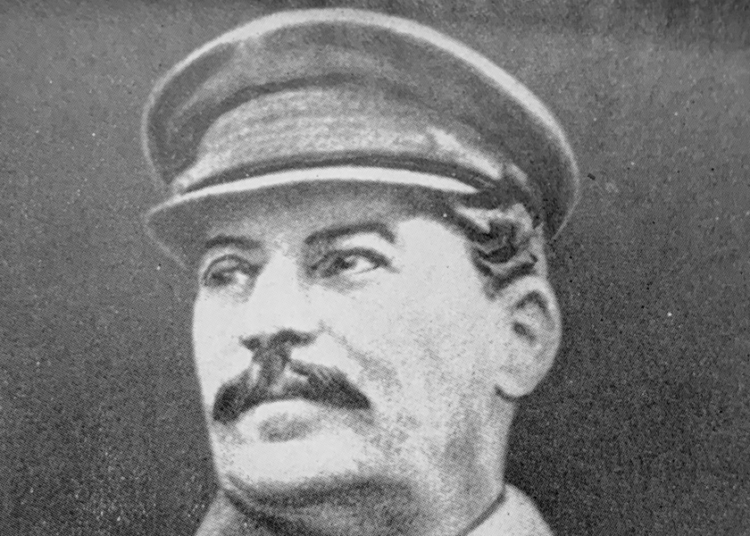WITH the growing possibility of people in Britain being imprisoned for their political, moral or religious beliefs – ‘hate crimes’ perceived to be ‘motivated by hostility based on race, religion, disability, sexual orientation or transgender identity’ are already offences carrying jail sentences – reading Alexander Solzhenitsyn’s 1968 novel The First Circle over Christmas proved a disturbing experience. Some reflections on it seem timely.
Set in Stalin’s Soviet Union from December 24 to 27, 1949, the novel’s characters in the fictional Mavrino special prison in the suburbs of Moscow are drawn from Solzhenitsyn’s own imprisonment under the Communist dictatorship.
Solzhenitsyn’s portrait of the darkness in Stalin’s soul is unforgettable. The 71-year-old dictator broods in his prison-like dacha at Kuntsevonear Moscowin the early hours of December 25:
‘Stalin’s most creative hours were the hours of darkness. In the mornings, his suspicious mind only ticked over slowly. At night, on the other hand, his mind, now supple and ingenious, would consider ways of splitting ministries up and devise new names for them . . .
‘All his best ideas came to him between midnight and four o’clock in the morning – how to welsh on the state lottery, for instance, by paying premium winners in new bonds instead of cash; how to introduce prison sentences for absenteeism; how to lengthen the working day and the working week; how to stop people changing jobs; how to frame new laws on forced labour and the death penalty; how to abolish the Third International; how to deport whole peoples to Siberia’ (Fontana Modern Novels, translated from the Russian by Michael Guybon).
The cruelty of a Marxist dictatorship which had abolished Christmas is also brilliantly portrayed. One of the main characters, Gleb Nerzhin, a mathematician sentenced to ten years’ imprisonment under Article 58 of the Soviet Criminal Code for criticising the regime, is allowed a rare meeting with his wife, Nadya, on December 25:
‘Nerzhin himself fully expected that he would have to serve a second term and spend the rest of his life in prison – it had happened to many of his comrades. This was not something he could put in a letter and he had to mention it now. A look of alarm appeared on Nadya’s face.’
Her own predicament trying to get a university job as the wife of a political prisoner in the Stalinist cancel culture is heart-rending: ‘Nadya spread out her hands in a gesture of helplessness. How could she explain that even in the university almost all work was classified as secret, and that any such employment involved a new, still more rigorous security check on her husband, her husband’s relatives and the relatives of their relatives. If she were to say that her husband had been sentenced under Article 58, she would not only be refused work at the university but forbidden to present her thesis as well.’
This description must surely resonate for Kevin Lister, the maths teacher banned from his profession for ‘misgendering’ a pupil. On December 23, the Telegraph reported: ‘Kevin Lister, 60, lost his job at a further education college after refusing to use a male name and pronouns to refer to a 17-year-old female pupil who identified as a boy. He also warned the pupil against “irreversible” surgical treatment. Mr Lister said he had lost “the best job in the world” after 16 years of teaching. He was later referred to the Disclosure and Barring Service (DBS), which informed him on December 19 that he would be banned from working with children.’
Are not the building blocks already in place for a neo-Marxist elective dictatorship in 21st century Britain where people are imprisoned for their beliefs? Labour promises to add another by makingmisgendering an ‘aggravated’ hate crime carrying a two-year prison sentence.
This might not intimidate Harry Potter author J K Rowling, who tweeted that she would ‘happily’ do the time ‘if the alternative is compelled speech and forced denial of the reality and importance of sex’. Though her moral courage in standing her ground would deserve praise, hers would be a high-profile prosecution with the buffer of enormous wealth. Conscientious teachers such as Kevin Lister and ordinary orthodox Christians prosecuted under such a law would not be so privileged or so noticed.
Solzhenitsyn’s masterpiece portrays the brutality of a regime which has banished Christ and humanity along with him. Indeed, the banished Christ is arguably the true hero of the story as it unfolds over Christmas.
The exiled Lord certainly triumphs over Stalin on Christmas morning: ‘He was an old man without any friends. Nobody loved him, he believed in nothing, and he wanted nothing . . . Helpless fear overcame him as he sensed the dwindling memory, the failing mind. Loneliness crept over him like a paralysis. Death had already laid its hand on him, but he would not believe it.’

